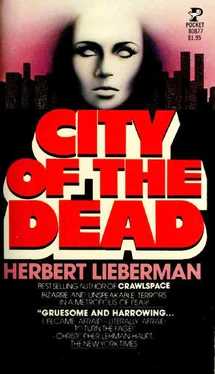Konig’s head snaps quickly about, his burning gaze locking with the Mayor’s. “Who told you that?”
“Oh, come on, Paul.” The Mayor yanks acigarette from his pocket. “I’ve known that for weeks. Just as Strang was so eager to inform on you in this mortician scandal, there are others just as eager to inform on him. You’ve got some very ambitious boys down there on your staff.” The Mayor grins slyly. “But I really didn’t need anyone to tell me. The minute Strang walked in here, I had him pegged. Show me a selfless, dedicated public servant, and I’ll show you a very ambitious man.”
“Who told you?” Konig asks again.
“That Strang had done the Robinson autopsy?”
“Yes—who told you that?”
Once again the sly smile spreads across the Mayor’s features. “You keep your secrets, Paul, I keep mine.”
“Probably Bonertz. Or Delaney—he’s unhappy enough.” The Mayor shrugs, smiles, touching his fingers to his lips to show they are sealed. “In any event,” he goes on, “I don’t want you to leave immediately. That would give it the look of a public hanging, and I will not permit that to happen.”
Konig stares grimly back out the window. “Then what do you propose?”
“I want you to slowly reduce your responsibilities over the next three months.”
“Phase myself out?”
“In a manner of speaking.”
“It’s only a matter of two more years, George,” Konig suddenly pleads. “Couldn’t you possibly—”
“No.” The finality of the Mayor’s word has the effect of a great gate closing. Konig’s hurt eyes linger for a moment on the Mayor’s stern but not unkindly features. Then they wander back out the window and south to the bridge. “It’s not only this Robinson business either, is it, George?”
“No,” the Mayor replies flatly. “It’s your health too.” Konig shakes his head and laughs bitterly. “They tell you everything around here, don’t they, George?”
The Mayor laughs out loud. “I’ve got an office full of selfless, dedicated public servants. But seriously, Paul. You’ve got to quit. You’re killing yourself. If you don’t leave soon, you’ll be carried out in a box.”
“I’d prefer that to this slow but discreet retreat you’ve got planned for me.”
“Skip the self-pity, Paul,” the Mayor snaps irritably. “It doesn’t become you. The minute you leave the City, a dozen foundations, universities, hospitals, will be banging at your door. You’ve still got a great deal of living ahead of you. Why the hell aren’t you under a doctor’s care?”
“I’m under my own care,” Konig’s voice rises harshly. “Who’s to be my successor?”
“Up to you entirely. I presume it won’t be Strang.”
“Pearsall’s your man,” Konig goes on matter-of-factly. “First-rate pathologist, and a good administrator. I trust him.”
The Mayor scratches the name on a pad. “Then so do I.”
“And just for future notice,” Konig continues, “I’ve got a man down there now, a kid, actually, but worth while watching.”
“How old?”
“Late twenties. Just out of school a few years but definitely a comer.”
“Name?”
“McCloskey—Tom McCloskey.”
Once again the Mayor scribbles hastily on his pad. The discussion ended, Konig now rises to go. The Mayor rises, too, and for a moment the two of them stand there awkwardly searching for a graceful way to end their talk. Suddenly the Mayor is laughing. “Thirty years I’ve known you, Paul, and you haven’t changed a bit. Not in all that time. You’re still the same surly, tough old son of a bitch you were then.”
Still laughing, the Mayor comes around his desk and throws an arm warmly about Konig’s shoulders. “Only Ida could take the bite out of you. Take the wind right out of your sails. God, how well I remember Ida, bless her soul. Remember the picnics and all the kids?” His arm still about Konig’s shoulder, they move slowly toward the door. “Your little girl—”
“Lauren? She’s a big girl now. Twenty-two.”
“Twenty-two.” The Mayor repeats the number wistfully, the march of all these years passing suddenly before his eyes. “Twenty-two, is it? I’m a grandfather three times over. What’s she doing with herself?”
“She’s an artist.”
“An artist?”
“They’re showing her paintings right now,” Konig says, swelling a bit with pride. “Some fancy gallery over on the East Side. Charging very fancy prices for them too. She’s coming home tomorrow,” he blurts out irrepressibly, not having intended to mention anything about Lolly. But the moment he says it, the moment the words are out, a great weight lifts from him, as if the saying of it actually makes it so. Suddenly he feels giddy and happy. “Yes, she’s coming home.”
“She been away?” the Mayor asks.
“Oh, just for a while,” Konig says, a kind of shy evasiveness in his eyes. “Little misunderstanding. But that’s all behind us now.”
“Good—very good, Paul.” The Mayor clasps his hand warmly. “All the better. Then the free time in the months ahead will be a good time for the both of you to get to know each other again.”
“Yes—I think so.” Konig’s face is glowing. “I think the first thing we’ll do is open up the place in Montauk. We can go out and stay for the whole summer. Lolly loves the ocean, you know.”
“Can’t say I blame her,” the Mayor booms. “Say hello to her for me. Tell her my Joanie is the mother of two now.”
Konig stands there by the door smiling rather idiotically, the Mayor still clasping him warmly by the hand but all the while jostling him gently out the door, a political liability now to be quietly, but swiftly, dispatched. “And, Paul,” he adds, lowering his voice a little conspiratorially, “don’t worry about all the trash you read in the papers. You’re still the best.”
A short time later Konig is back downtown at his desk trying to tunnel through more of the unfinished paperwork. The unanswered letters sit there, a quiet reproach, awaiting him.
It is Saturday morning and so the place is empty. He has it to himself and he relishes the quiet of it. His mind still harks back to his conference with the Mayor. The forced retirement had disheartened him, but he knew, of course, that it was coming. The fact that their conversation took place in the informality of the Mayor’s home rather than at City Hall, as well as the fact that Konig was permitted to pick the time, was the tip-off to what the purpose of the meeting was. So it came as no shock. That he was disheartened was quite true. But walking out of there this morning, he’d also felt a curious exhilaration, as if a great weight had been lifted from him. It had all to do, he knew, with Lolly. The fact that she was coming home now, and that thing the Mayor had said (quite inadvertently, because he knew nothing of Lauren Konig’s situation) about their having “time to get to know each other again.” It was that that had set him off, buoyed him so, had him whistling all the way down from 89th Street to the Medical Examiner’s Office on 30th. In slightly more than twenty-four hours now they’d be together again. After a separation of five months, they’d be a family once more.
Then, too, when he’d walked in that morning around 11:30, made his coffee on the Bunsen burner, watered his plants, lit his first cigar of the day, he’d seen a plain white envelope on his desk with his own name typed across the face of it. It was Carl Strang’s resignation. Curt, succinct, devoid of acrimony, it simply declared he was leaving. It asked for nothing in the way of favors or references. Konig was relieved. It even added to his exhilaration.
Then he turned to his correspondence.
Читать дальше












